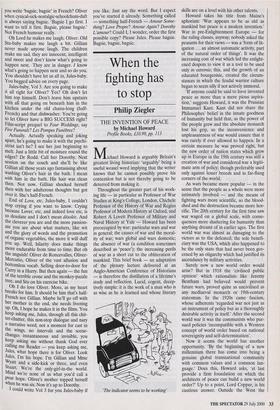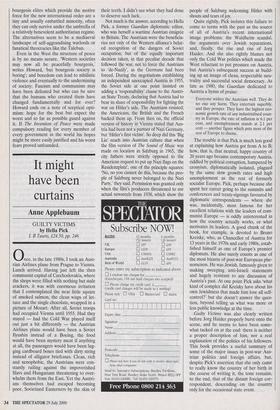When the fighting has to stop
Philip Ziegler
THE INVENTION OF PEACE by Michael Howard Profile Books, £10.99, pp. 113 Michael Howard is arguably Britain's greatest living historian: 'arguably' being a useful weasel word implying that the writer knows that he cannot possibly prove his contention but is not thereby going to be deterred from making it.
Throughout the greater part of his work- ing life — in particular as Professor of War Studies at King's College, London, Chichele Professor of the History of War and Regius Professor of Modem History at Oxford, and Robert A Lovett Professor of Military and Naval History at Yale — Howard has been preoccupied by war: particular wars and war in general; the causes of war and the moral- ity of war; wars global and wars domestic; the absence of war (a condition sometimes described as 'peace'); the increasing perils of war as a short cut to the obliteration of mankind. This brief book — an adaptation of the plenary lecture delivered at an Anglo-American Conference of Historians — is therefore the distillation of a lifetime's study and reflection. Lucid, cogent, decep- tively simple: it is the work of a man who is as wise as he is learned and whose literary The indicator seems to be working' skills are on a level with his other talents.
Howard takes his title from Maine's aphorism: War appears to be as old as mankind but peace is a modem invention.' War in pre-Enlightenment Europe — for the ruling classes, anyway; nobody asked the peasants for their views — was a 'form of lit- igation ... an almost automatic activity, part of the natural order of things'. It was the increasing cost of war which led the enlight- ened despots to view it as a tool to be used only in extremis; this, and the growth of an educated bourgeoisie, created the circum- stances in which the feudal warrior culture began to seem silly if not actively immoral.
`If anyone could be said to have invented peace as more than a mere pious aspira- tion,' suggests Howard, it was the Prussian Immanuel Kant. Kant did not share the Philosophes' belief in the innate goodness of humanity but held that, as the power of the people grew and the absolute monarch lost his grip, so the inconvenience and unpleasantness of war would ensure that it was rarely if ever allowed to happen. In a certain measure he was proved right, but the new order of nation states which grew up in Europe in the 19th century was still a creation of war and considered war a legiti- mate arm of policy; though preferably used only against lesser breeds and in far-flung corners of the world.
As wars became more popular — in the sense that the people as a whole were more intimately involved — and the means of fighting wars more scientific, so the blood- shed and the destruction became more hor- rific. The 20th century for the first time saw war waged on a global scale, with conse- quences more shattering for humanity than anything dreamt of in earlier ages. The first world war was almost as damaging to the victors as to the defeated; the sole benefi- ciary was the USA, which also happened to be the only state that had never been gov- erned by an oligarchy which had justified its ascendancy by military activities.
Surely now a new world order would arise? But in 1918 the 'civilised public opinion' which rationalists like Jeremy Bentham had believed would prevent future wars, proved quite as uncivilised as any mediaeval monarch or 19th-century statesman. In the 1920s came fascism, whose adherents 'regarded war not just as an instrument of policy but as a thoroughly desirable activity in itself.' After the second world war it was the communists who pur- sued policies 'incompatible with a Western concept of world order based on national sovereignity and self-determination'.
Now it seems the world has another opportunity. 'By the beginning of a new millennium there has come into being a genuine global transnational community with common values and a common lan- guage.' Does this, Howard asks, 'at last provide a firm foundation on which the architects of peace can build a new world order?' Up to a point, Lord Copper, is his cautious answer. Outside the West the bourgeois elites which provide the motive force for the new international order are a tiny and usually embattled minority, often they can only survive under the umbrella of a relatively benevolent authoritarian regime. The alternatives seem to be a mediaeval landscape of self-aggrandising warlords or fanatical theocracies like the Taleban.
Even in the West the structure of peace is by no means secure. 'Western societies may now all be peacefully bourgeois,' writes Howard, 'but bourgeois society is boring'; and boredom can lead to nihilistic violence and eventually to the undermining of society. Fascism and communism may have been defeated but who can be sure that the humans who created them have changed fundamentally and for ever? Howard ends on a note of sceptical opti- mism: hope for the best but expect the worst and so far as possible guard against it. If The Invention of Peace were made compulsory reading for every member of every government in the world his hopes might be more easily justified and his worst fears proved unfounded.



























































 Previous page
Previous page